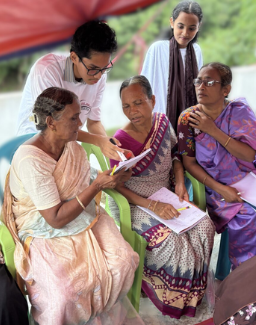‘Meaningful change starts with empathy’

This article was originally published by Clark University.
Sitting in my Twin XL bed at 1 a.m. in Hughes Hall last December, going over notes for a final, I had no idea the email I was about to open would reveal a glimpse into my future. Its subject line read “Projects for Peace,” a title that come summer 2025 would leave a massive impact on my life.
Projects for Peace is a global program that encourages young adults to develop innovative, community-centered, and scalable responses to the world’s most pressing issues. Each year, the program grants $1.25 million to student leaders to implement a project anywhere in the world. As I read about the program on that December night, I paused studying for my final and imagined a project I could carry out in Rangamati, my family’s hometown in Bangladesh.
Rangamati is a place of striking beauty, with rolling hills, winding lakes, and a rich patchwork of ethnic and cultural traditions. But beneath this beauty lies another reality: stark economic disparities and deep social divisions based on ethnicity and religion. Parents in Rangamati work tirelessly to give their children better lives, yet many of them have never had the chance to pursue education themselves. For years, I’ve carried deep pride in where I come from coupled with the ache of guilt for those who wanted more but lacked resources.
I found out in March that I received the $10,000 Projects for Peace grant and launched Egiye Jao (“Go Ahead”), a program I designed to offer evening classes in math and English to parents. When I arrived in Bangladesh in July to carry out this initiative, I felt a deep nervousness, caught between excitement and fear, unsure of whether the community would embrace me or if I could truly live up to the responsibility I had taken on. I recruited local college students to serve as program teachers, training them in culturally sensitive methods and peace-building facilitation. Instead of classrooms, we held lessons in tents set up on open fields, neutral spaces where people from all backgrounds could gather. There, arithmetic and English became more than subjects: learning became a common ground for vulnerability and connection, an opportunity for parents to see beyond their cultural differences and bond over shared dreams.
The program lasted two weeks and about 45 students participated. Because most families came from challenging financial backgrounds, the program was designed to support them in multiple ways. Parents received snacks, lunches, compensation for their time, and school supplies to take home to their children. I wanted Egiye Jao to be more than an educational initiative: It was a space for people to feel seen, heard, and valued.
Pursue your passions
As parents acquired essential skills, they also gained the ability to see the world through one another’s eyes, forging unexpected alliances and challenging long-held prejudices. This cultural shift doesn’t just break cycles of division; it ignites a movement toward unity that ripples through homes, schools, and neighborhoods, cultivating a future where peace replaces conflict.
I will never forget one mother in the program who told me she had once been a brilliant student but was pulled from school so her brothers could continue. She remembered watching her brothers leave each morning while she stayed home, waiting for a chance that never came. Later married off, she hadn’t touched a book in years. On our final day, she thanked me for reigniting her passion for learning, for giving her back a part of herself she thought was lost forever. Her story reminded me how privileged I am to be at Clark and why I want to dedicate my future to amplifying the voices of those denied opportunities.
The college students serving as program teachers were impacted as well. One young teacher told me how grateful he was to apply his academic skills in a meaningful way. In a country where youth unemployment is a major challenge, Egiye Jao gave him not only practical experience but also the chance to cultivate peace in his own community. For him, it was more than a stipend — it was a steppingstone.
In the middle of the program, the monsoon rains arrived. Flooding washed through Rangamati, breaking down our tents and making roads nearly impossible to pass. I feared the classes would stop. But to my surprise, parents showed up carrying umbrellas, feet splashing through muddy paths, determined not to miss a lesson. The college students came too, sometimes soaked to the bone but smiling, ready to teach.
Projects for Peace taught me that helping people doesn’t always require grand solutions.
Sometimes it’s as simple as listening, creating space, and validating experiences. The grant made scaling this project possible, but the deeper lesson I carry is that meaningful change starts with empathy and the willingness to act. In Rangamati, I came to understand that peace is not merely the absence of war; it is the presence of opportunity, the chance for individuals to grow, to learn, and to be heard.
I know I will carry this experience in everything I do. I’m thankful for the unwavering support of my friend Joshua Alex Jones and my cousin Shawon Barua. Joshua believed in my vision from the very beginning, encouraging me to apply for the grant. Shawon stood by my side in Bangladesh, helping me navigate logistics, confront challenges, and reminding me why the work mattered. Their faith in me gave me the strength to keep going, even when obstacles felt overwhelming.
To other students considering Projects for Peace, my advice is simple: Take the leap. If you have an idea, this program gives you the resources and platform to make it real. The work is challenging, but the reward is immeasurable. You’ll leave not only having helped others but also with a clearer sense of the kind of change-maker you want to be.

